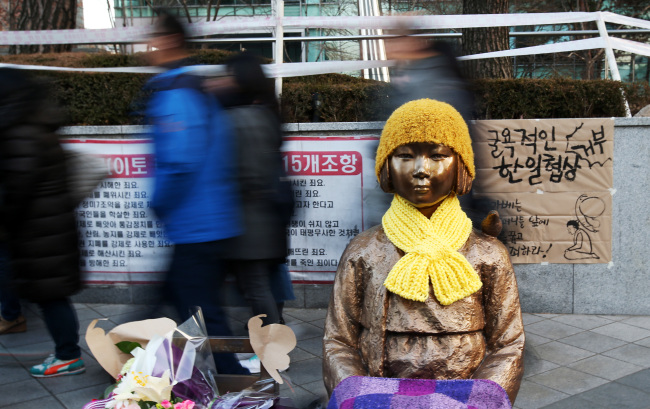South Korea and Japan’s epochal agreement Monday to settle the comfort women issue drew angry reactions from surviving Korean victims, ethnic Koreans living overseas, activist groups and opposition politicians, who called for an unconstitutionality suit to invalidate the settlement and the resignation of South Korean Foreign Minister Yun Byung-se.
The deal, which included Tokyo’s apology for Korean victims and a fund of 1 billion yen ($8.29 million) for Seoul to establish a foundation to support surviving victims, did not clearly admit Japan’s legal responsibility for the institutionalized sex slavery during World War II, the victims and activists said.
A total of six nongovernmental organizations supporting the surviving victims, including the victims themselves, together issued a statement Tuesday criticizing both governments for not discussing the settlement with them, announcing that they are thinking of approaching the Constitutional Court to invalidate the settlement.
 |
| Pedestrians walk past a statue symbolizing Korean victims of Japan`s wartime sex slavery set up in front of the Japanese Embassy in Seoul. Tokyo has demanded to remove the statue as part of Monday`s South Korea-Japan settlement over the “comfort women” issue. Yonhap |
“The apology is rather vague and it’s hard to believe that Tokyo is being sincere,” the NGOs, including the House of Sharing and the Korean Council for the Women Drafted for Military Sexual Slavery by Japan, said in a statement.
“If the motivations were sincere, Japan’s Prime Minister Shinzo Abe should’ve offered an apology himself, instead of sending the nation’s foreign minister on his behalf.”
The NGOs also said they are “flabbergasted” at the South Korean government for accepting the “absurd” conditions of the settlement, including to consider it “final and irreversible” as long as Tokyo properly follows through on its promises, and agreeing to “find solutions” to Tokyo’s demand to shift the statue of a girl symbolizing victims from outside the Japanese Embassy in Seoul
Following the statements by the NGOs, Rep. Lee Jong-kul floor leader of the main opposition Together Democratic Party, called for the resignation of Foreign Minister Yun Byung-se and an official apology from President Park Geun-hye for accepting Tokyo’s conditions in the settlement.
“Our party cannot accept this agreement,” Rep. Lee said. “The settlement shows that the government did not consult the surviving victims and NGOs at all before singing the deal.”
Lee called the settlement just as “humiliating” as the 1965 South Korea-Japan Normalization Treaty, which was signed by former President Park Chung-hee, the father of current President Park Geun-hye.
With the 1965 treaty, South Korea received a $300 million grant in economic aid. Despite Seoul’s repeated demands for an apology and legal compensation for the victims since the 1990s, Tokyo has said that all reparations in regard to “claims” — including the issue of “comfort women” — between the two countries were settled in 1965.
In fact, Tokyo’s Foreign Minister Fumio Kishida told Japanese reporters after signing the deal on Monday that Japan still maintains the same legal stance about the “comfort women” issue, meaning it was legally and “finally and completely” settled under the 1965 treaty. He told reporters that Tokyo still has no plans to acknowledge legal responsibility and pay reparations, but instead decided to advocate the establishment of the government-backed fund for the surviving victims.
“Our party is determined to ask the current administration at the National Assembly why it agreed to the settlement being ‘final and irreversible,’” Rep. Lee said. “We are also going to find out why the settlement even mentions the possibility of removing the statue that symbolizes the victims from outside the Japanese Embassy in Seoul.”
Meanwhile, the Korean American Forum of California, a group of Korean-Americans supporting the surviving Korean sex slavery victims based in San Francisco, also issued a statement condemning the agreement between the two governments.
“The ‘comfort women’ issue is an example of institutionalized sexual slavery and one of the largest cases of human trafficking and human rights violations in the world,” the organization said in a statement. “There are surviving victims of Japan’s wartime slavery in 10 other countries aside from South Korea. Tokyo mentioned nothing of them in the agreement, limiting the issue as something that only happened between Korea and Japan, while it should be recognized as a universal human rights issue.”
The group also criticized Japan’s demands regarding the statue and the settlement being final. “The motivation is obviously to prevent the issue being talked about on the world stage anymore,” the group said. “And if Japan is truly sorry about what happened, they wouldn’t have any problems with having the statue in front of their embassy.”
Some Japanese activists supporting Korean victims also expressed concerns over the settlement between the two nations.
Watanabe Mina, secretary-general of the Tokyo-based Women’s Active Museum on War and Peace, said the agreement does not mention anything about educating the future generations on the issue. “One of the most important things about the ‘comfort women’ issue is to remember and educate so it does not repeat in the future,” she said. “Not only did Tokyo mention nothing about education, it demanded to remove the very symbolic statue, which will only help the public remember the war atrocities.”
The General Association of Korean Residents in Japan, one of two main organizations of ethnic Koreans living in Japan and has close ties to North Korea, also heavily criticized the South Korean government for signing the deal in spite of Japan’s eyebrow-raising conditions, calling the agreement a “humiliation.”
“It is humiliating because Seoul accepted Japan’s ‘irreversible’ apology that does not even say anything about national or legal responsibility,” said Ri Dong-je, a representative of the group’s affiliate organization consisting of North Korean sympathizers, in a statement. “The South Korean government should stop betraying its own citizens by giving in to Japan’s unreasonable requests. Japan, on the other hand, should take full legal responsibility of its inhumane war crimes in the past.”
By Claire Lee (dyc@heraldcorp.com)

